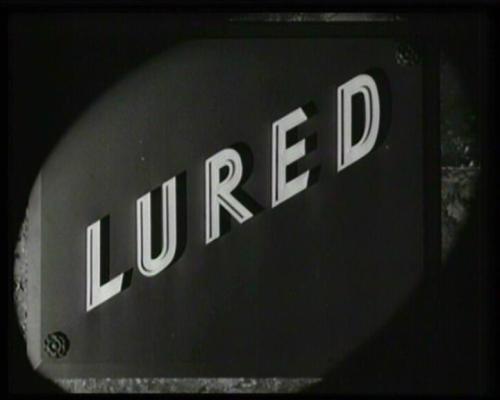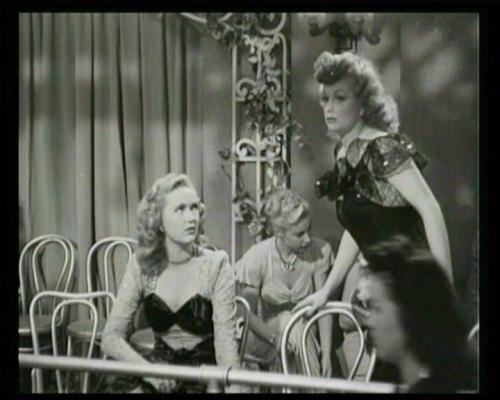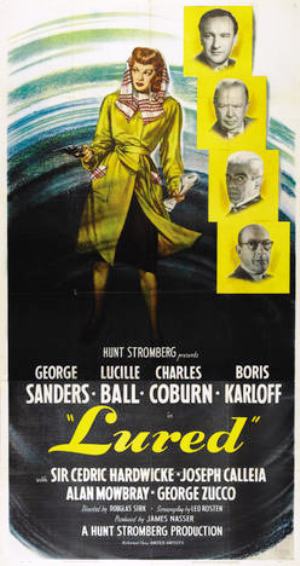Jealousy’s eyes are green my dear, don’t let yours turn that dreadful colour.
You’re incorrigible.
Of course I am. I am an unmitigated cad.

That’s George Sanders playing the smooth as silk Robert Fleming in Douglas Sirk’s 1947 whodunit LURED.
The film starts with a good looking girl travelling on a bus in the heart of 40’s London, in her hand is a tiny piece of newspaper. The camera punches into a close of said paper and we see it has been taken from the personals section. This girl is on her way to a date. She disembarks the bus and meets her potential suitor on a street corner, we do not see the chap of course, only his shadow protrudes from behind the wall, the girl seems pleased to meet the man and they walk off. We see the pair enter a restaurant but the mysterious figure is only shown in silhouette behind a curtain, the girl, sitting opposite him and in full view, chats excitedly. We jump cut to an interior. A shadow, obviously our man, types out an envelope marked to the police, a gloved hand removes the letter. We cut to a letter box as the gloved hand posts the note. We then find ourselves in the offices of the police the next day as they read the letter, revealing the “Poet Killer” has struck again……
Have a look at the aforementioned scene. It’s a great example of cinematic “showing” not “telling”. Watch out for the neat delivery of information on the sandwich board and also the clever way that Sirk instigates the camera move as they walk into the restaurant.
Following the initial deliberations by the law we are taken to a wonderful dancehall scene. Girls line up at the side of the room and willing punters have to pay sixpence for the honour of dancing with them for 5 minutes, it’s interesting stuff. Did these places really exist?? If so, it just shows how crass our courting rituals have become. The fact that lonely gentlemen were happy to part with their hard earned cash for a 5 minute waltz is quite sweet, and totally alien.

We are introduced to two of the dancing girls (both American) they chat and one reveals she has scored herself a hot date via the personal columns, it’s like the internet but with personality; the other (whilst her freind “dances”) is approached by a talent agent and offered an audition at a higher class of establishment. The unfortunate half of the pair with the date inevitably ends up as the poet killer’s latest victim, the lucky one, who goes by the name of Sandra Carpenter and is played by Lucille Ball, ends up getting a job as a lady detective with the police to be used as bait to snare her friend’s killer. There’s no interview for this job, she’s only asked to hitch up her skirt to the knee and describe Charles Coburn with her eyes closed.
Fake notices are placed in the personal ads of London’s newspapers in the hope that the serial killer will come out of his rotten woodwork and attempt to abduct our powerful female protagonist. It’s at this point the film takes a fantastic diversion. It involves Boris Karloff in a 10 minute cameo and should really just be watched rather than explained……. It’s GREAT!
It’s during a faux date that Sandra finds herself tricked into the company of Robert Fleming, the creamy smooth nightclub magnate who originally offered her the audition. Does it sound far fetched? Well it is. This is where the film strays from its initial path; the investigation is dropped from our attention for a noticeable period to concentrate on their blossoming relationship until Fleming himself finds himself implicated as the poet killer. The last act and eventual revealing of the killer plays out in a rather rushed fashion.
Although a weakness, it wouldn’t say it renders the picture ruined. Sirk, like ALL THAT HEAVEN ALLOWS (the only other offering of his I’ve seen to date) gives us a strong female lead who effortlessly holds the cards in a man’s world. There are some great scenes here and Charles Coburn delivers his usual enjoyable performance as the no nonsense police chief.
Recommended………








